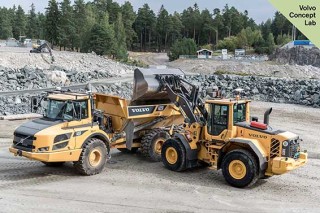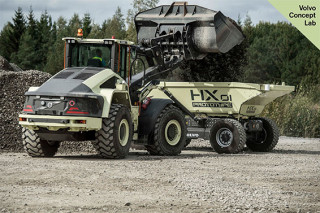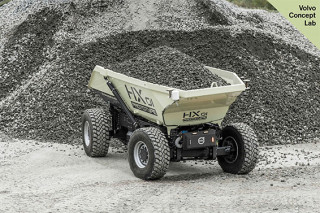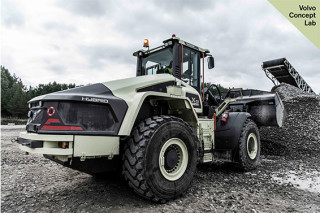Volvo Construction Equipment has been working on automated construction machinery and recently gave a public demonstration in Sweden of a prototype wheeled loader filling a prototype articulated hauler – before dumping its load and repeating the cycle. In a one-hour comparison it was found that the autonomous wheel loader could reach the equivalent of 70% of that of a skilled operator’s productivity levels when loading and unloading, Volvo says.
“The demonstration machines were programmed to work together and carry out a specific set of actions on a pre-defined route,” explains Jenny Elfsberg, director of emerging technologies at Volvo CE. “The machines can perform the same task over and over again, along a fixed route, for a relatively long period of time. But it’s still early days for this technology, we are working on developing solutions that have the required safety and performance levels that the market will accept.
“There is still a long way to go so there are no plans for industrialization at this stage,” she continues. “Currently these prototype machines don’t communicate with each other and machine-to-machine communication technology – where machines ‘talk’ to one another and to a central control point – is crucial when it comes to avoiding collisions and facilitating an efficient flow of equipment."
The demonstration machines were an automated L120 wheel loader and an A25F articulated hauler, pictured above.
Volvo CE has been working on autonomous machine research for more than a decade. Its focus on futuristic technology such as autonomous machines is fuelling the development of mid-term innovations at the company. Technology such as semi-automated or automated functions will support more immediate developments years before it’s possible to realise the ultimate goal, the company says. There are already cases of automated and assist-functionalities on the market today. For example, earlier this year Volvo CE launched Volvo Co-Pilot, a system that offers a range of intelligent machine services – Load Assist, Dig Assist, Compact Assist and Pave Assist – to help operators deliver higher quality outcomes, in less time and with less effort.
“We are starting to see systems that are less dependent on operator skills, ones that support operators with guidance or control primary functions,” says Jenny Elfsberg. “In the future we will see increased machine autonomy and the operator will act more in a supervisory capacity. This will provide less stressful, more interesting work for operators, with perhaps several machines being controlled remotely by one operator. Of course some tasks are so complicated that you really need to feel what you’re doing, and in those cases we will still need operators controlling the machines from inside the cab.”

Volvo also demonstrated the new concept HX1 autonomous, battery-electric, load carrier, pictured below, with the LX1 prototype hybrid wheeled loader – a machine with the potential to improve fuel efficiency by up to 50%.
The LX1 loader is a series hybrid that incorporates a driveline that consists of electric drive motors mounted at the wheels, electric hydraulics, an energy storage system, a significantly smaller diesel engine and new machine architecture. It’s this combination that enables the substantial gain in fuel efficiency, Volvo says. The prototype – which has 98% new parts and a fundamentally new machine design – is capable of doing the work of a wheel loader that’s one size larger. At this stage, the LX1 is part of a research project and it is not commercially available.
However, Volvo has teamed up with its customer Waste Management – the largest environmental services and recycling company in North America – to field test the LX1. Waste Management, which owns one of the largest fleets of Volvo CE equipment in the world, is currently running a conventional machine to gather baseline data at two of its facilities in California. The LX1 is being shipped to the States so that it can carry out fuel efficiency and emission reduction tests at these sites.
“From the minute we were introduced to the LX1 we knew we wanted to work with Volvo CE to prove the concept in the real-world environments we operate in,” says John Meese, senior director of heavy equipment at Waste Management. “We are anticipating excellent results when it comes to reducing the use of fossil fuels and lowering exhaust emissions. An additional benefit is the dramatic reduction in noise pollution.”





